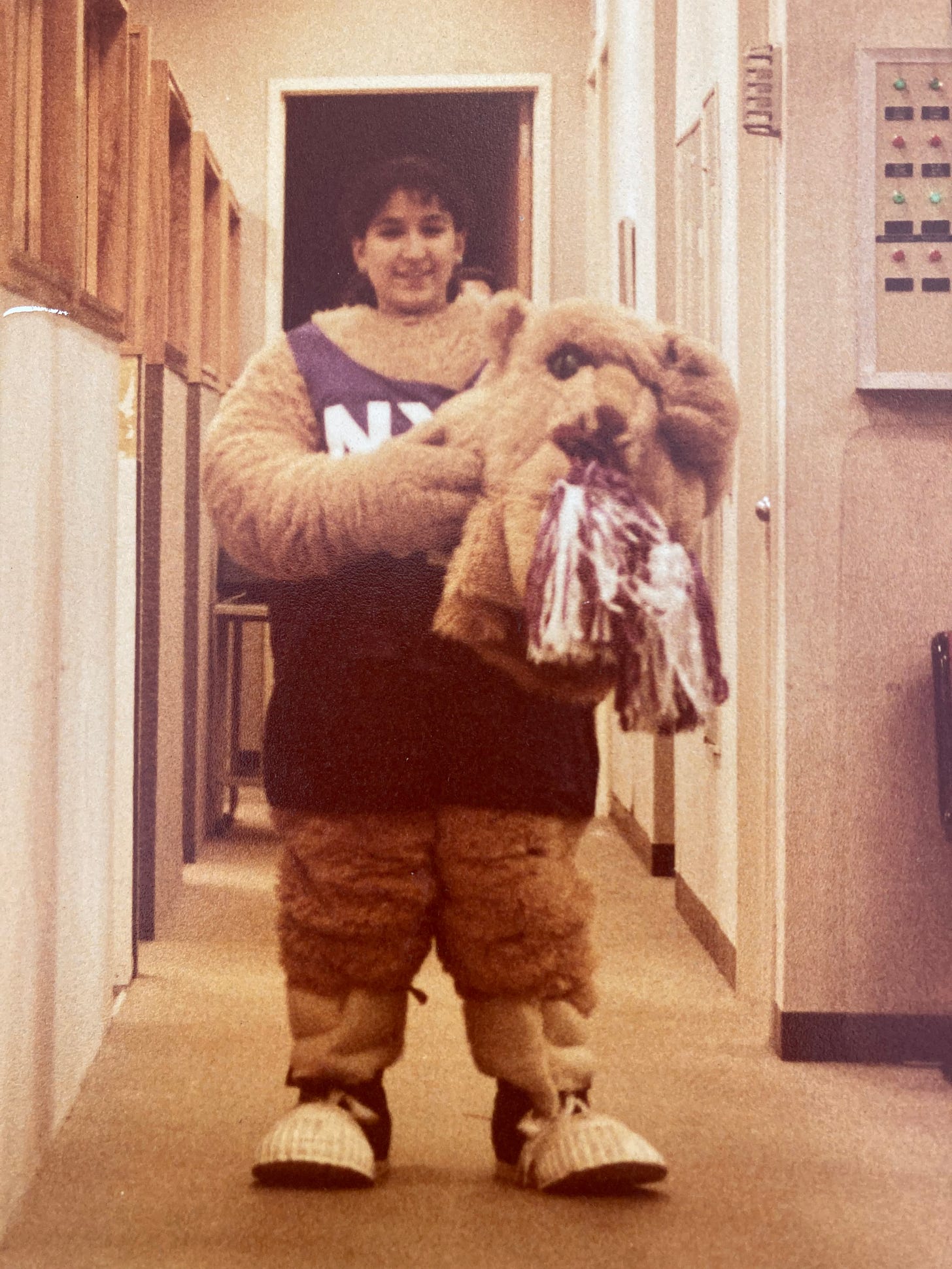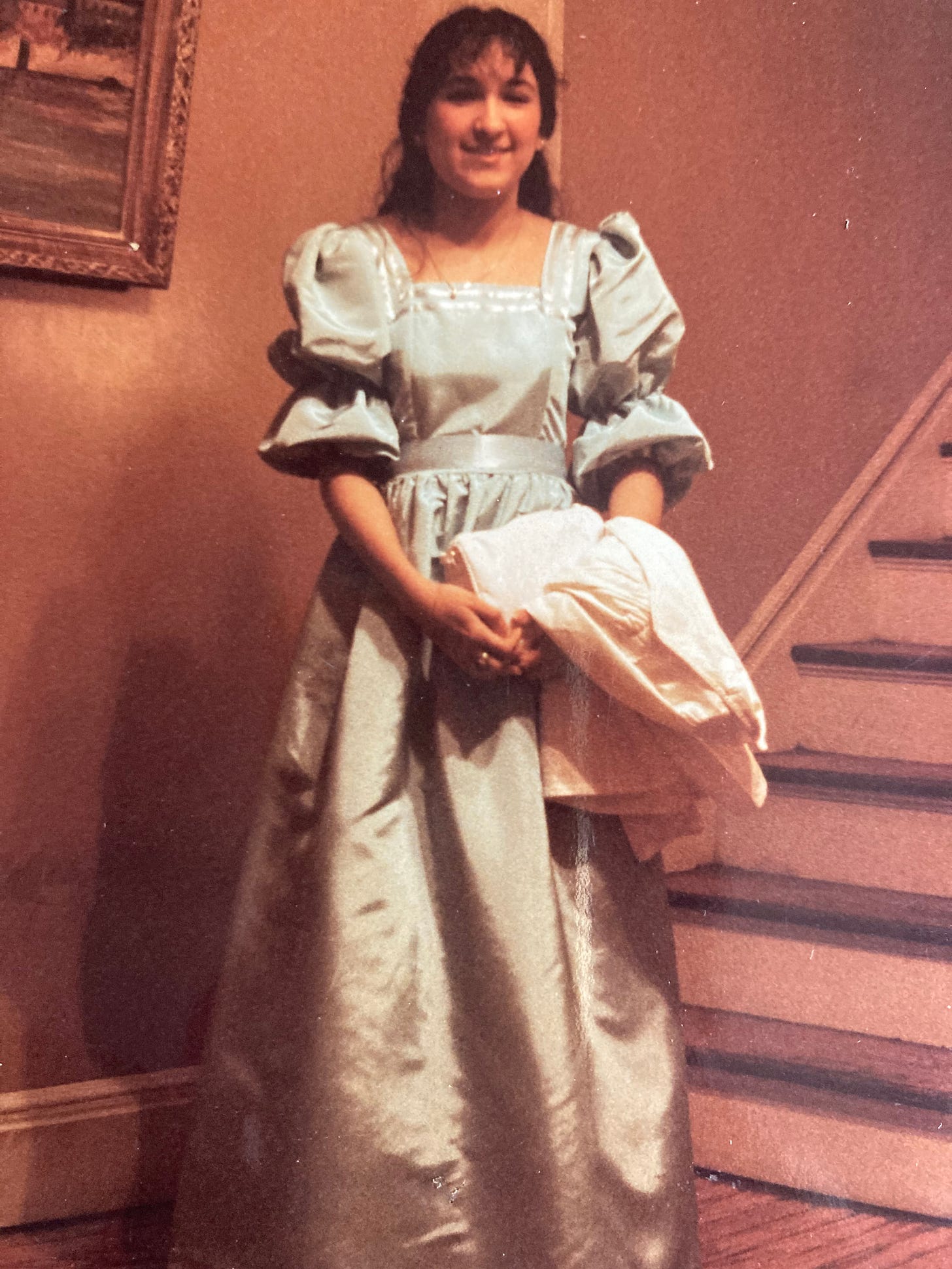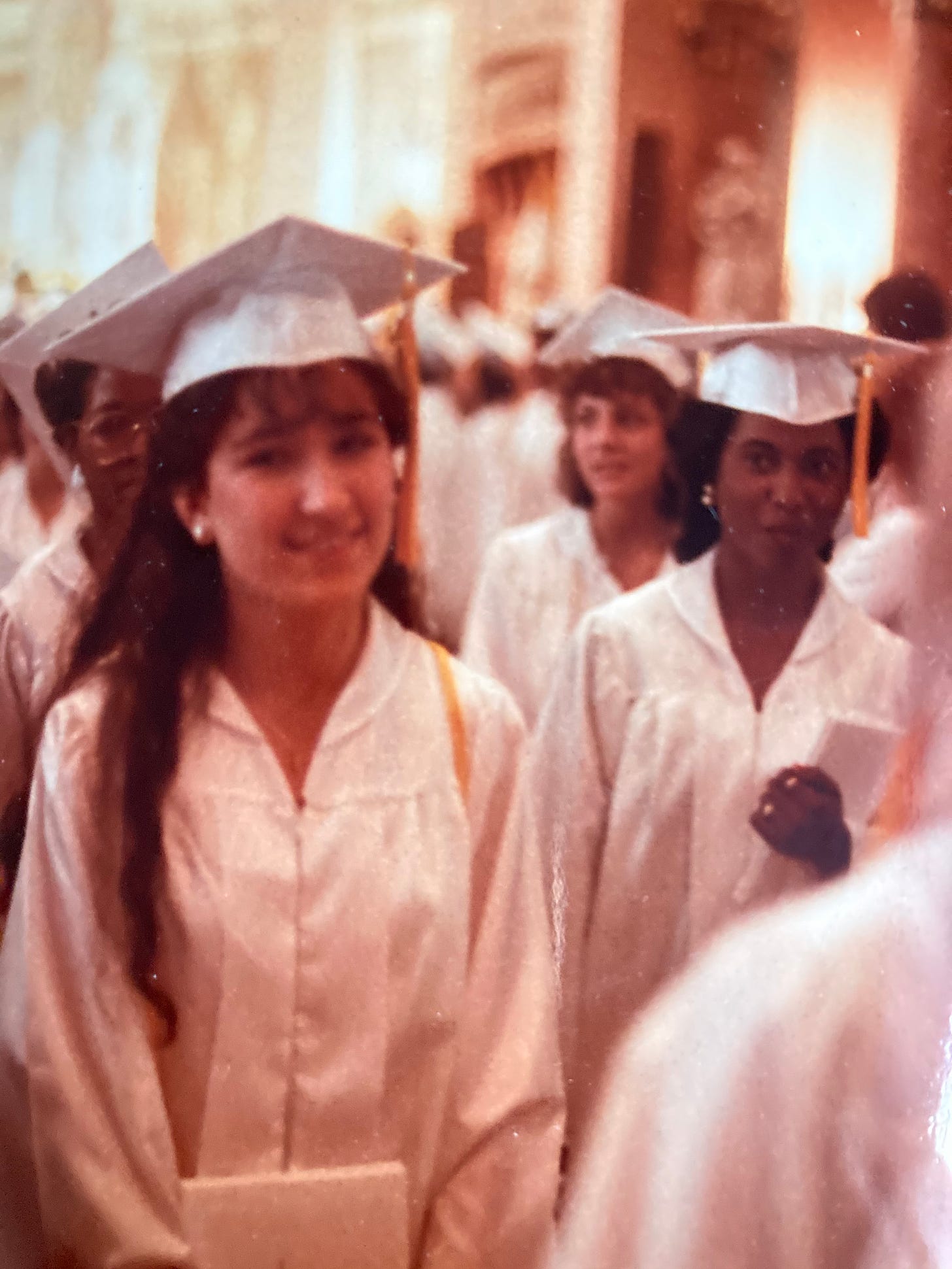Letter to My Younger Self #4: Hungry Like the Wolf
Author Helene Stapinski encourages her college-age self not to give up on her dreams of becoming a writer.

Dear Helene,
I see you there, June of 1983, in your powder blue prom gown, covered in blood. You’re looking down at it, horrified like Carrie in that movie you saw when you were a little kid. Your limo-mate, Lisa, has just bled all over you, having sliced her finger open on a razor blade while straightening lines of cocaine in the bathroom of a cavernous New York City dance club. The place is called Starbucks, and it’s where you and your Jersey City classmates have all chosen to go post-prom. It’s years before the coffee chain by the same name will make its debut.
The Starbucks deejay is playing “Hungry Like the Wolf” by Duran Duran:
A scent and a sound
I’m lost and I’m found
And I’m hungry like the wolf.
It’s an awful moment, but probably not the actual low point of 1983. You are 18 years old and lost between two worlds: The world of Jersey City, which you are leaving on the express ramp, and the world you are about to step into, blindly, i.e. The Rest of the World.
Your high school guidance counselor, a nun, has just told you a few weeks earlier that you should be an engineer because you are good at science. But your grades are good in all your classes. You are a nerd (albeit a nerd with cool friends who snort cocaine). What you most want is to become a writer. You tell Sister Peggy this and she laughs at you.
“No, becoming a writer is too hard,” she says, chuckling. “You should be an engineer.” You have no idea what an engineer even is. As far as you know, it’s a man in a puffy hat who drives a train. You do not want to drive a train.
In a few months, as a freshman on scholarship at NYU, you will commute to school each day, since your parents can’t afford room and board. You will get snide looks from rich girls in your journalism class because you wear the same red cable knit sweater from the Gap every other day. When fellow NYU students ask you to go shopping at Tower Records with them, you say you are busy. Though you love music and will one day play drums in a rock band (the subject, in the far future, of your second book), you have no money for records right now. You don’t even have money for lunch.
You are 18 years old and lost between two worlds: The world of Jersey City, which you are leaving on the express ramp, and the world you are about to step into, blindly, i.e. The Rest of the World.
While most of your fellow students eat in the dining hall of their dorms, you microwave your mother’s leftovers during your work study lunch break at the Coles Sports Center, where you check law students in for their squash courts. Until last week, you thought squash was just a vegetable. When they are late for their court, you have to give their reservation away to one of several other arrogant law students who are standing there. They are on the waiting list and are pressuring you. You hate them. And this job. And the two other jobs you have — one of them as the mascot for the NYU basketball team, where you dress in a suffocatingly hot Bobcat suit, prancing across the court, pretending to have fun.

Each day, you sit at the back of the class, lacking confidence and wondering silently why NYU even admitted you. You are in way over your head. Students laugh together about Letterman from the night before, but you barely know who he is. You have to go to bed early to get up and go to work every morning. The other students talk about study abroad programs that you can’t afford. They raise their hands high with confidence in lit class and then blather on and on and on about how Franz Kafka’s Hunger Artist is an existential exercise in the ambiguity and absurdity of life. You know all about it, but would never dare get up and proclaim it to a lecture hall of 200.
Then your writing teacher, Sue Maushart, calls you into her office hours at the end of freshman year and you are sure you’ve done something wrong. But she explains to you that you are a writer. That you need to be a writer. She is the antithesis of Sister Peggy. “Do you know how to go about that?” Sue Maushart asks. “How to become a writer?”
You do not. Your mom works at the DMV, your dad in a frozen food warehouse.
You are flattered by your professor’s suggestion, but you have no idea what to do and are overcome with anxiety. But slowly, surely, the confidence will come. Over the next few years – using Sue Maushart’s roadmap — you will find your way and realize that your writing is better than the writing of those rich girls — and boys — in your journalism class. And yes, even in that pretentious Kafka class.
What you most want is to become a writer. You tell Sister Peggy this and she laughs at you. “No, becoming a writer is too hard,” she says, chuckling. “You should be an engineer.” You have no idea what an engineer even is. As far as you know, it’s a man in a puffy hat who drives a train.
I’m here from the future to tell you that you shouldn’t worry so much about it, that you will work it out, but it’s the anxiety, of course, that drives you, that makes you work harder than everyone else around you. You will publish four books by the time you are 57, including one about a German Jewish refugee who is saved from the Holocaust by the publisher of Superman. You will be the writer and producer on a PBS documentary based on your first book and will publish regularly in the New York Times. And you will teach writing, surprise, surprise, at NYU, and make a habit of calling the best writers, often the most sensitive and underconfident writers, into your office to tell them what they can become.
But it will take a while. And there are some Kafkaesque, existential days ahead. You have to take a semester off because your Teamster father goes on strike and you can’t pay the small amount of your tuition not covered by your scholarship. Your mother writes NYU a check that bounces and from then on, you are sent to the interminably long “problem line” every time you register for classes.
Facing the possibility of not graduating, you will go to the dean and tell him of your dilemma. When he sees your GPA and hears you are the school mascot he will hand you a scholarship check, enough to cover your tuition with some leftover for a summer study abroad trip to Italy.
I’m here from the future to tell you that you shouldn’t worry so much about it, that you will work it out, but it’s the anxiety, of course, that drives you, that makes you work harder than everyone else around you.
After you graduate, you’ll take a job at the local paper in Jersey City covering the police beat. You will write a story every day about the worst day in someone else’ life: murders, robberies, tenement fires. Each day when you trawl the Jersey City police precincts looking for the news of the day, the desk sergeant will (more than once) say to you, “Hey, there was a rape last night. Come in the back and I’ll tell you about it.” You want to stab him in the jugular vein with your pen, but instead you laugh and walk on. Because this is 1990 and this is how women reporters are treated. You will meet the cute obituary writer at the paper and fall in love.
You write so well that the editor gives you your own column. You are the first female opinion columnist ever in Jersey City (somehow this is 1991, not 1951). People who disagree with your opinions send you hate mail and tell you to get a job as a nurse or a secretary like other women. (Again, remarkably this is 1991, not 1951). One sends you a copy of your column wrapped around a dirty maxi-pad. It’s time to go.
You will move to Nome, Alaska, as far as you can run without leaving the country, to work at a radio station as a new director. While camping in the snow on a story assignment, you will hear hungry wolves howling far in the distance and think back to that Duran Duran song and your prom dress horror. And of Kafka.
You are the first female opinion columnist ever in Jersey City (somehow this is 1991, not 1951). People who disagree with your opinions send you hate mail and tell you to get a job as a nurse or a secretary like other women. (Again, remarkably this is 1991, not 1951). One sends you a copy of your column wrapped around a dirty maxi-pad.
You will never return to New Jersey to live. But on your return to civilization, you will settle in New York City with your cute boyfriend, no longer the obituary writer, but now a reporter at New York Newsday. You’ll get married (and will eventually give birth to two children), but right now you are still anxiety ridden and wondering how on earth you will make it here — or anywhere — as a writer. With your husband’s help, and with a fellowship, you will go to graduate school and start writing stories about Alaska. And Jersey City. After graduation, you will sell that first book — that book about the world you left behind.
It’s the twist in the plot, the bit you never saw coming. That place you ran away from will help propel you into the Real World and make you a writer.









I'm still waiting for that building to crack in half!
"And you will teach writing, surprise, surprise, at NYU, and make a habit of calling the best writers, often the most sensitive and underconfident writers, into your office to tell them what they can become."
Beautiful essay. Thank you.